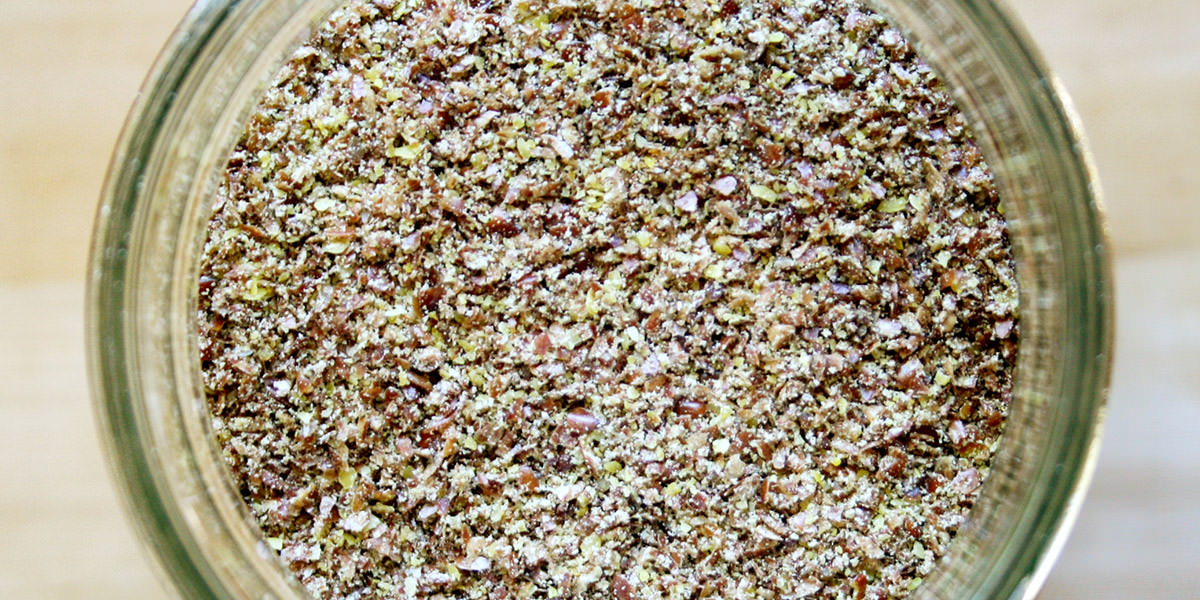Flax Seeds
Grown since the dawn of civilization, flaxseeds are nutty, delicious, and very easy to combine into many dishes. Ground up; add them to baked goods, breads, pancakes, muffins, oats, smoothies, salads, as an egg replacement, and more.
- Flaxseeds have the most lignans of any plant food. Lignans are a fiber-related polyphenol that provides our body with antioxidant benefits along with support to the cardiovascular system by reducing blood cholesterol and triglyceride levels.
The antioxidant content in flaxseeds is actually higher than that of blueberries and olives, and has long been associated with decreased risk of heart disease. - Flaxseeds are one of the best sources of alpha-linolenic (ALA) Omega-3 fatty acids, which help to protect our blood vessels from inflammation. ALA’s are also known to reduce the risk of heart disease and cancer.
- The manganese and lignans in flaxseeds can actually help to lower risk of oxidative stress and chronic inflammation, which occurs when our body has too many reactive oxygen-containing molecules.
- Studies have also shown that eating flaxseeds decrease the ratio of LDL (bad) to HDL (good) cholesterol, therefore promoting healthy blood pressure levels.
Vegukate Tips:
Flax can be purchased ground or whole. It’s best to purchase flax seeds whole, and then grind them yourself up to get all the nutrients from their shell and keep them fresh. Purchase whole flax seeds (much cheaper, better quality) and grind them up yourself in a blender or coffee grinder! Grind them in small quantities to use right away, or store in the refrigerator in an airtight jar.
Flax seeds work wonders as an egg replacement in baking recipes – seriously! To make a flax egg, combine 1 tablespoon ground flax seeds with 3 tablespoons of warm water. Stir well and let sit to thicken, about 5 minutes or so. This flax egg substitutes for one regular egg and is wonderful in cookies, cakes, muffins, and more!
-
Vegan Cacao Peppermint Smoothie

Mint and chocolate flavor and a balance of protein, fat, and fiber makes this vegan Cacao Peppermint Smoothie a delectable treat. Enjoy! Read the recipe
-
Turmeric, Coconut and Ginger Smoothie

Warming ingredients + vibrant nutrient-dense foods = sunshine in a glass! Read the recipe
-
Gluten-Free Chunky Monkey Banana Bread (and Loving Lately!)

Grain-free & Gluten-Free Chunky Monkey Banana Bread made without any refined sugar and loaded with plenty of goodness! Read the recipe
-
Whipped Chia Seed and Flax Seed Raspberry Pudding

Sweet raspberries + healthy fat filled seeds, avocado, and coconut milk make this breakfast the perfect nourishing treat! Read the recipe
-
Peanut Butter and Jam Overnight Oats

Creamy peanut butter overnight oats bursting with fresh blackberries in every single bite: hello simple & fiber-rich breakfast goodness! Read the recipe
-
Chunky Grain-Free Chocolate and Coconut Granola

Grain-free and gluten-free granola packed with delicious fats and goodness! Read the recipe
-
Pumpkin Spice Seed and Oat Bowl

Creamy oats and nutty seeds + warming pumpkin pie spice + fiber-rich pumpkin = a delicious seasonal breakfast bursting with autumn flavors! Read the recipe (1 comment)
-
Red Velvet Beetroot Brownies

White beans + red beet + oat flour + sweet vanilla and maple syrup + chocolate = red velvet brownies, duh. Read the recipe (3 comments)
-
Pumpkin Pecan Breakfast Cookies

Perfect antioxidant packed pumpkin + fiber filled flax and oats + crunchy pecans and pumpkin seeds + sweet dried cranberries + creamy nut butter + a taste of maple syrup = cookies, breakfast and autumn style. Read the recipe
-
Spiced Pumpkin Waffles

Warming spices + seasonal pumpkin + fiber filling oat flour + creamy almond milk + all of the best autumn toppings = a pumpkin spiced waffle dream! Read the recipe (5 comments)
-
Banana Walnut Crumble Muffins

Sweet and ripe bananas + crunchy walnuts + fiber friendly oat flour + warming cinnamon + healthy fat filled coconut oil = muffins that are absolutely bananas. Read the recipe (2 comments)
-
Oat & Seed Power Jars

Soaked oats + Heaps of soaked seeds + "Sunwarrior plant power powder + fresh seasonal fruit + almond milk + sweet dates = your new favorite way to power up! Read the recipe (2 comments)
-
Oatmeal Raisin Breakfast Cookies

Eating cookies for breakfast is perfectly acceptible when it's these Breakfast Cookies filled with pure, plant goodness! Read the recipe (3 comments)
-
Raw Buckwheat Porridge

Sprouting for health and a delicious raw buckwheat porridge. Your mornings are going to get even more nutritious and delicious! Read the recipe
-
Pumpkin Pecan Superseed Granola

Why seasonal eating is better for our bodies & the most perfect pumpkin granola that ever was. You're going to love this one! Read the recipe
-
Tropical Green Smoothie

Kale on its own tastes like earth and nutrition. Kale in a tropical smoothie doesn’t taste like kale. It tastes like pineapples, and sweetness, and delicious, nutritious victory. Read the recipe

